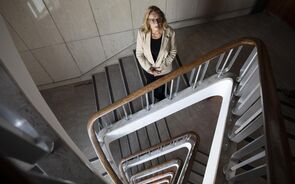Swiss National Bank Takes $60B in Troubled UBS Assets
5 mensagens
|Página 1 de 1
Acções: A ING segue a desvalorizar mais de 10% em Amsterdão após rumores que dão conta da necessidade de injecção por parte do governo, o que poderia acontecer este fim de semana.
A maior instituição de serviços financeiros da Holanda, o ING, está a afundar na praça de Amesterdão mais de 14%, com rumores de que poderá vir a ser alvo de uma intervenção estatal durante o fim-de-semana
Via plataforma
Cumpt
só existe um lado do mercado, nem é o da subida nem o da descida, é o lado certo
só existe um lado do mercado, nem é o da subida nem o da descida, é o lado certo
AIG já utilizou dois terços da linha de crédito da Fed
(17-10-2008 - 08:55)
A American International Group (AIG), já utilizou dois terços da linha de crédito de 122,8 mil milhões de dólares disponibilizada pela Reserva Federal (Fed) norte-americana, tendo já pedido emprestado mais de 80 mil milhões de dólares.
A AIG, que está a vender negócios para conseguir pagar os empréstimos do governo, já pediu emprestados 82,9 mil milhões de dólares (61,65 mil milhões de dólares) desde que foi salva de entrar falência, anunciou ontem a Reserva Federal (Fed) norte-americana, segundo a Bloomberg.
Esta semana foi a primeira em que a seguradora recorreu não só à linha de crédito de 85 mil milhões de dólares, como também aos 37,8 mil milhões de dólares disponibilizados pela Fed no dia 8 de Outubro, anunciou o porta-voz da seguradora Nicholas Ashooh citado pela Bloomberg.
“Nós temos um plano que nos vai permitir pagar o empréstimo à Fed e surgir como uma seguradora forte” afirmou Ashooh, segundo a agência noticiosa norte-americana.
A AIG pretende vender algumas unidades como as do ramo vida norte-americana afirmou o presidente executivo da seguradora, Edward Liddy, no início deste mês. Ontem o responsável reiterou a necessidade de cancelar as despesas desnecessárias e bonificações.
Big
Cumpt
só existe um lado do mercado, nem é o da subida nem o da descida, é o lado certo
só existe um lado do mercado, nem é o da subida nem o da descida, é o lado certo
Zenith Escreveu:Para a economia suiça 60b USD representa cercade 20% do PIB!!!
Por comparação os 700b USD do plabo Paulson representam (apenas!!!) 5-6% do PIB americano.
Fico cada vez mais com a ideia que Europa esta pior que os US, mas são mais lentos a fazer as contas.
Por uma vez que Europa tinha oportunidade de ganhar alguma supremacia beneficiando dos erros americanos, parece que preferiram o papel de imitadaores ampliando os erros.
ou entao os EUA, os 700 B e' apenas um pensinho rapido... muitos riem-se dos 700 B que nao sao nem uma fatia do que sera' necessario...
Otra coisa e'... quando os 700 B estavam pa votos, veio o Paulson e o Bernanke dizer "rapido passem isto rapido se n tivermos os 700 B segunda feira, nao temos Economia"...
Entretanto já passou o que ? 3 semanas ou 1 mes, e nem sequer começaram a dar uso ao plano...
enfim
Para a economia suiça 60b USD representa cercade 20% do PIB!!!
Por comparação os 700b USD do plabo Paulson representam (apenas!!!) 5-6% do PIB americano.
Fico cada vez mais com a ideia que Europa esta pior que os US, mas são mais lentos a fazer as contas.
Por uma vez que Europa tinha oportunidade de ganhar alguma supremacia beneficiando dos erros americanos, parece que preferiram o papel de imitadaores ampliando os erros.
Por comparação os 700b USD do plabo Paulson representam (apenas!!!) 5-6% do PIB americano.
Fico cada vez mais com a ideia que Europa esta pior que os US, mas são mais lentos a fazer as contas.
Por uma vez que Europa tinha oportunidade de ganhar alguma supremacia beneficiando dos erros americanos, parece que preferiram o papel de imitadaores ampliando os erros.
- Mensagens: 201
- Registado: 29/11/2007 14:36
- Localização: Aveiro
Swiss National Bank Takes $60B in Troubled UBS Assets
Swiss National Bank Takes $60B in Troubled UBS Assets
By Howard Schneider
Washington Post Staff Writer
Thursday, October 16, 2008; 1:01 PM
Swiss authorities moved to stabilize their storied banking system today, agreeing to take $60 billion in troubled assets off the books of financial giant UBS and put them into a special government-backed fund, in a deal financed at least initially by the U.S. Federal Reserve.
In a forceful example of how dollars from the Fed are being put to work in the global financial system, the Swiss National Bank said it would use up to $54 billion from the Fed to buy "illiquid securities" from UBS.
The Fed announced earlier this week that it would provide dollars on an unlimited basis to a consortium of foreign banks, including Switzerland's, in hopes of freeing up world credit markets that have all but ceased to function. Though the foreign banks post their own currency with the Fed in return, protecting the balance sheet of the U.S. central bank, the Swiss announcement said access to dollars through the Fed allowed them to pursue a major bailout that might have been hard to finance otherwise.
"Since the entire operation will be effected in U.S. dollars, it will not affect the National Bank's monetary policy in any way," the Swiss bank said in a news release.
The Swiss deal attempts in a single step to cleanse UBS's balance sheet of the mortgage-backed and other assets that have tangled the global financial system.
UBS will post $6 billion toward the sale, but the Swiss central bank will put up the rest with money obtained through its "swap line" with the Fed. Swiss authorities said they intend to find other financing in the future, to replace the money from the United States.
The Swiss government also announced it was investing $5 billion of public money directly into the bank, a reversal for a country that had taken a more hands-off approach even as its European neighbors moved to shore up or even nationalize their financial institutions.
But given the implications of a UBS failure -- the mega-bank's asset base is four times the size of the Swiss economy -- Swiss officials said they felt compelled to insure against the worst.
"This operation is unprecedented with regard to the reasons for it," Swiss National Bank president Jean-Pierre Roth said in a written statement this morning. Though the financial crisis may be in the process of easing, following action by governments and central banks worldwide, Roth said it was "preferable that we go ahead with this operation now . . . rather than at a later point under potentially more adverse conditions."
A second major Swiss bank, Credit Suisse, announced that it had reached its own agreement with the central bank to increase its capital base with a new investment of roughly $8.8 billion from a consortium of global investors. Credit Suisse said the largest participant is a subsidiary of the Qatar Investment Authority, a sovereign wealth fund controlled by the government of Qatar, an oil-rich Arab emirate on the Persian Gulf. The Qatar Investment Authority is already a major shareholder in Credit Suisse.
The bank, headquartered in Zurich, also reported a third-quarter net loss of about $1.14 billion, reflecting new writedowns of about $2.1 billion.
The Swiss actions are similar in concept to what the United States is doing with part of the recently enacted financial bailout law. But rather than removing troubled assets on a piecemeal basis -- the United States intends to buy them from banks through a still-to-be-defined auction process -- the steps announced today are a "definitive move" to fix the problem, said UBS chief executive Marcel Rohner.
Since 2007 UBS has had to decrease the value of mortgage-backed assets it held by some $47 billion to reflect the declining value of the underlying securities, mostly mortgages on homes and office buildings in the United States.
Under today's action, UBS can sell up to $60 billion worth of troubled assets to the central bank. Though it will contribute $6 billion to underwrite the sale, the central bank will be responsible for any losses beyond that. If the fund turns a profit -- and Swiss authorities say the underlying securities are valuable enough for it to do so -- UBS can buy the securities back, and split any profit with the central bank.
UBS shareholders and customers "now have the certainty that our risks related to these distressed assets have been substantially removed," Rohner said, while still allowing the bank to profit if the original loans and deals prove profitable.
USB has raised $25 billion in private capital this year to bolster its balance sheet. The additional announcement of a $5 billion government investment follows similar European and U.S. moves to put public capital directly into banks.
http://www.washingtonpost.com/wp-dyn/co ... 87_pf.html
5 mensagens
|Página 1 de 1
Quem está ligado:
Utilizadores a ver este Fórum: As_paus , cisne3, fatura.pt, jcpequeno, latbal, Lisboa_Casino, Mmmartins, niceboy, Nuno V, paul_invest, PAULOJOAO, trilhos2006, xeidafome e 168 visitantes



